

Public consultation on the II National Action Plan 1325/2000 on Women, Peace and Security
On 21 July 2014 a public consultation was initiated about the Ministers' Council draft resolution that approves the II National Action Plan for the implementation of the United Nations Security Council Resolution 1325/2000 on Women, Peace and Security.
The Observatory on Gender and Armed Violence participated in the consultation submitting its analysis and proposals on the II NAP.
OGAV expressed two main concerns regarding the Portuguese NAP 2015-2019. One concern is tied with its interministerial operationalisation and the sectoral policies involved, while the second is associated with the NAP's absence ambition and policy articulation, failing to contemplate both war and post-war scenarios and formal peace settings, including domestically.
Read OGAV's contribution (in Portuguese)
Publication of the op-ed "A guerra não declarada contra os jovens negros brasileiros"
Recentently the Huffington Post published the op-ed by Tatiana Moura and Gary Barker on the structural, institutional and direct violences endured by young black men in Brazil.
Panel "Resisting global gendered wars", International Conference "Resisting War in the 20th Century", 28 February 2014
The panel, organized by OGAV/CES, focuses on the gendered ideologies and practices of war and on the politics of gendered resistance to war, violence, patriarchy and militarism. By referring to global gendered wars we aim to shed light to the ubiquitous though diversified gendered constructs – gendered discourses of violence justification and its actors, representations of violent strategies and narratives of the “war and homefronts”- that underlie large-scale wars (led by state and non-state actors) as well as “violent peace” scenarios, where high levels of interpersonal and criminal violence coexist with stable political regimes. Specifically, we will examine the variable and contingent ways in which resistance to war and violence is gendered, that is how existing gender relations affect/are acted upon in situations of dissent, and how gender is reflected in resistance (peaceful and violent) and mobilization against violence.
The presentations include: s "Guerillas, gangsters and beyond: gender, violence and resistance in wartime and post-war El Salvador", by Sílvia Roque (OGAV/CES), "Gendered 'gun wars' in Brazil: participation and representation in the gun debates", by Rita Santos (OGAV/CES), "Living Peace: masculinities beyond war", by Tatiana Moura (OGAV/CES) and "Sexual violence and securitization: western media discourses on DRC", by Anastasia Maria Oprea.
Seminar "Youth and affirmation processes in the city of Praia, Cape Verde"
On 25 November, OGAV-CES organises the seminar "Youth and affirmation processes in the city of Praia, Cape Verde", led by Redy Wilson Lima (Instituto Superior de Ciências Jurídicas e Sociais de Cabo Verde).
In Cape Verde, youth represents the majority of the population and thus the country's main driving force. If, on the one hand, they are presented as the main agents of sustainable development in the archipelago, on the other hand, they are portrayed as dangerous, lazy, restless and irresponsable and, thus, in need control, which contributes to emergence of a situation of youth unease or even unrest. This seminar intends to discuss the issues surrounding Cape Verdean youth, especially their forms of social and political contestation and strategies of socio-identity affirmation.
The seminar will take place at 17h, room 2, CES-Coimbra.
Publication of the Special number “Mulheres e Guerras: representações e estratégias” of the Revista Crítica de Ciências Sociais
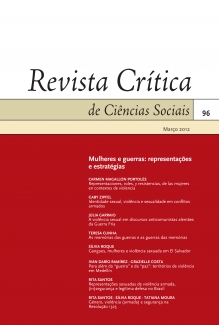 Tatiana Moura, Júlia Garraio and Sílvia Roque (OGAV/CES) organised the special number of the Revista Crítica de Ciências Sociais entitled “Mulheres e Guerras: representações e estratégias” [“Women and Wars: representations and strategies”, in English], now available, in full, on the website Revues.org.
Tatiana Moura, Júlia Garraio and Sílvia Roque (OGAV/CES) organised the special number of the Revista Crítica de Ciências Sociais entitled “Mulheres e Guerras: representações e estratégias” [“Women and Wars: representations and strategies”, in English], now available, in full, on the website Revues.org.
This publication, comprised eight original articles, two book reviews and a virtual space, intends to contribute to broaden the analysis of the representations of violence perpetrated against women and sexualized strategies of control and power used in traditional war contexts as well as scenarios of extreme armed violence.
Read the edition (full access)
Session "O lado masculino do género: masculinidades e (não)violências", 21 March 2013
9 January 2013
Within the Gender Workshop, organised by Júlia Garraio, Catarina Martins, Teresa Cunha (NHUMEP/CES) and Mihaela Mihai (DECIDe), Katia Cardoso (OGAV/CES) will lead a session on "O lado masculino do género: masculinidades e (não)violências" [“The Masculine side of gender: masculinities and (non)violences”, in English] on March 21st 2013, at 17h, in CES-Coimbra.
The session aims to discuss the topic of masculinities and insecurity, based on the articles "Young Men and the Construction of Masculinity in Sub-Saharan Africa. Implications for HIV/AIDS, Conflict, and Violence” (Gary Barker and Cristine Ricardo, 2006, In Ian Bannon e Maria C. Correia The other half of gender: World Bank) and "In search of masculinity: violence, respect and sexuality among Puerto Rican crack dealers in East Harlem" (Philippe Bourgois,1996, British Journal of Criminology, Summer: 412).
International seminar "Gender-based violence in armed conflicts", Instituto de Defesa Nacional (IDN), 4 December 2012
4 December 2012
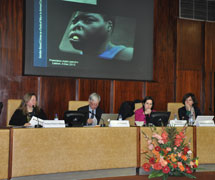 The Instituto da Defesa Nacional organized on December 4th 2012, in Lisbon, an international seminar on “Gender-based violence in armed conflicts”, including panels on “The roots and expressions of Gender-based Violence”; “GBV and International Law”; “Fighting Against Gender-based Violence”.
The Instituto da Defesa Nacional organized on December 4th 2012, in Lisbon, an international seminar on “Gender-based violence in armed conflicts”, including panels on “The roots and expressions of Gender-based Violence”; “GBV and International Law”; “Fighting Against Gender-based Violence”.
Sofia José Santos (OGIVA/CES) presented the communication "UNSCR1325 national implementation - challenges ahead", summarizing the main findings of the OGAV/AJPaz research “Women, Peace and Security and the implementation of the United Nations Security Council Resolution 1325 in Portugal", funded by the Portuguese Commission for Citizenship and Gender Equality (CIG) and assessing the Portuguese Action Plan for the implementation of 1325.
Session "Feminisms and International Relations", School of Economics, University of Coimbra
16 November 2012
On November 16th, Rita Santos (OGAV/CES) lectured on "Feminisms and International Relations", in the discipline of International Relations Theory, School of Economics, University of Coimbra (FEUC/UC). The session aimed to discuss the different feminist perspectives in IR, especially in the field of violence, peace and international security.
Launch of the new number of the Amnesty International-Portugal Magazine
30 June 2012
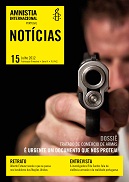
The June 2012 edition of the mazine of the Amnesty International Portugal was now launched. This number includes a special feature on the Arms Trade Treaty and an interview with Rita Santos (OGAV) on gun violence in Portugal and the future of the ATT. The interview highlights several expressions of gun violence in non war contexts, the Portuguese reality of gun violence and the advantages of a global Arms Trade Treaty, which will be in discussion in the UN during the next month.
Two new OGAV publications
28 May 2012
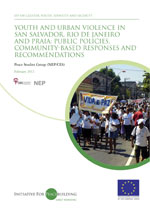 Recently the working papers “Youth and Urban Violence in San Salvador, Rio de Janeiro and Praia, Public Policies, Community-based responses and Recommendations”, by Carla Afonso, Katia Cardoso, Rita Santos, and Sílvia Roque; and “Women and gun violences. The cases of San Salvador, Rio de Janeiro and Maputo”, by Rita Santos, Sílvia Roque, Sara Araújo and Tatiana Moura were published. The reports were one of the outcomes of the research project Initiative for Peacebuilding Early Warning (IfP-EW) (http://www.ifp-ew.eu/).
Recently the working papers “Youth and Urban Violence in San Salvador, Rio de Janeiro and Praia, Public Policies, Community-based responses and Recommendations”, by Carla Afonso, Katia Cardoso, Rita Santos, and Sílvia Roque; and “Women and gun violences. The cases of San Salvador, Rio de Janeiro and Maputo”, by Rita Santos, Sílvia Roque, Sara Araújo and Tatiana Moura were published. The reports were one of the outcomes of the research project Initiative for Peacebuilding Early Warning (IfP-EW) (http://www.ifp-ew.eu/).
The first report provides an overview of key public security policies and community-based initiatives addressing the issue of youth violence in Rio de Janeiro (Brazil), San Salvador (El Salvador) and Praia (Cabo Verde).
Read working paper (in English): http://www.ifp-ew.eu/pdf/201202IfPEWYouthViolenceRioSanPra.pdf
In turn, the second working paper sheds light on two key factors at the heart of gun violence in San Salvador, Rio de Janeiro and Maputo: the dissemination and misuse of small arms, and deep-rooted gender power imbalances.
Read working paper (in English): http://www.ifp-ew.eu/pdf/IfPEW20110501WomenAndGunViolence.pdf
Fall seminar of the Portuguese Observatory on SALW Production, Trade and Proliferation (OPPCPAL), 23 November 2011
25 November 2011
 On the 23rd November 2011, OPPCPAL promoted a closed seminar in Lisbon on “Small Arms and Light weapons proliferation – Information, knowledge and action are necessary!”, with the objective of understanding the current Portuguese situation of small arms control. José Manuel Pureza and Rita Santos represented OGAV in the debate, with focused on the impacts of the successive changes to the national law on firearms and ammunition, the non functioning of the Online Management System of Weapons and Explosives and its potential uses and applications in connecting the actors that manage small arms in the hands of civilians as well as the role of civil society in promoting public awareness and debate on the importance of arms control as a tool of violence prevention.
On the 23rd November 2011, OPPCPAL promoted a closed seminar in Lisbon on “Small Arms and Light weapons proliferation – Information, knowledge and action are necessary!”, with the objective of understanding the current Portuguese situation of small arms control. José Manuel Pureza and Rita Santos represented OGAV in the debate, with focused on the impacts of the successive changes to the national law on firearms and ammunition, the non functioning of the Online Management System of Weapons and Explosives and its potential uses and applications in connecting the actors that manage small arms in the hands of civilians as well as the role of civil society in promoting public awareness and debate on the importance of arms control as a tool of violence prevention.
In addition to the members of OPPCPAL, the seminar gathered Pedro Clemente, Lusíada University; Maria João Leote de Carvalho, New University of Lisbon; Raul Oliveira, jurist; Eugénio Fonseca, president of Caritas Portugal; and Margarida Saco, vice-president of Pax Christi – Portugal.
Read the main conclusions of the seminar (in Portuguese)
Read background document (in Portuguese)
Publication “Youth, Collective Urban Violence and Security: Key Findings”
1 November 2011
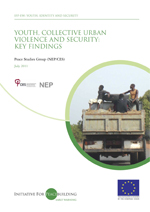 The Peace Studies Group (now Humanities, Migrations and Peace Studies Group) and OGAV/CES have just launched the report “Youth, Collective Urban Violence and Security: Key Findings”. The report, only available in English, is one of the main outcomes of the group’s participation in the Initiative for Peacebuilding Early Warning (cluster Youth, Identity and Security).
The Peace Studies Group (now Humanities, Migrations and Peace Studies Group) and OGAV/CES have just launched the report “Youth, Collective Urban Violence and Security: Key Findings”. The report, only available in English, is one of the main outcomes of the group’s participation in the Initiative for Peacebuilding Early Warning (cluster Youth, Identity and Security).
Based on case studies in Rio de Janeiro, San Salvador, Praia and Bissau, this paper discusses three main challenges facing research and policy making regarding collective urban youth violence. It argues for a shift of focus in research from the analysis of “problematic” youth to how violence impregnates daily lives and becomes normalised through specific local, social and political conditions; argues for a change of focus in the analysis of the violent mobilisation of youth, emphasising the need to address the appeal of symbolic revenues permeating the search for valued social status and possibilities in contexts of adversity and violence; supports an urgent shift at global and national policy levels, affirming that repressive policies have hitherto failed to contain youth violence or improve preventive policy design.
Read Youth, Collective Urban Violence and Security: Key Findings
Launch of the report "Why Women? Effective Engagement for Small Arms Control",
by Corey Barr and Sarah Masters, IANSA Women's Network
26 October 2011
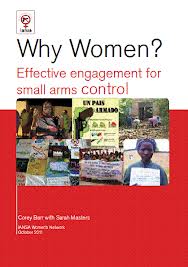 The report "Why Women? Effective Engagement for Small Arms Control", by Corey Barr and Sarah Masters, from the IANSA (International Action Network on Small Arms) Women's Network, has just been published. The report, based on 17 interviews with practitionners and experts from around the world, aims to answer to the question raised by one of the delegates during the negotiations on the United Nations General Assembly Resolution "Women, disarmament, non-proliferation and arms control": "Why women?".
The report "Why Women? Effective Engagement for Small Arms Control", by Corey Barr and Sarah Masters, from the IANSA (International Action Network on Small Arms) Women's Network, has just been published. The report, based on 17 interviews with practitionners and experts from around the world, aims to answer to the question raised by one of the delegates during the negotiations on the United Nations General Assembly Resolution "Women, disarmament, non-proliferation and arms control": "Why women?".
The publication, only available in English, includes section on: Recognising existing engagement and leadership; Taking into account the various roles promoting gun violence/undermining peace and security; Better understanding the problem; Making programmes more effective; Democratising peace and security; Challenges; and Areas for action.
Leymah Gbowee, Ellen Johnson-Sirleaf and Tawakul Karman win the 2011 Nobel Peace Prize
8 October 2011
Leymah Gbowee and Ellen Johnson-Sirleaf, both from Liberia, and Tawakul Karman, from Yemen, have just been awarded the 2011 Nobel Peace Prize.
Ellen Johnson-Sirleaf was the first women elected president in the African continent. Since her election, in 2006, she has been working for peace and security in Liberia, highlighting the need to guarantee women's rights and ensure the participation of women in the building of the future in the country. Ms. Johnson-Sirleaf has also been active in campaigning for a global Arms Trade Treaty. IANSA Woman Leymah Gbowee mobilised and organised women from different ethnicities and religions to stop war in Liberia, drawing attention to the experiences of women in armed violence situations and their initiatives to prevent and erradicate this and other types of violence. Ms. Gbowee was also involved in the presidential campaign of Ellen Johnson-Sirleaf. In 2006, Ms. Gbowee co-founded the organisation WIPSEN-Africa, which has played an important role in advancing women's rights in Africa, particularly in war affected West African countries. Tawakkul Karman is one of the pionners of the struggle for women's rights and democracy in Yemen.
Shortly after the death of Wangari Maathai, awarded with the Nobel Peace Prize in 2004 for her work in sustainable development, peace and democracy, several human rights, peace and women's rights organisations, alongside with the Observatory on Gender and Armed Violence, congratulate the decision of the Nobel Comitee and its recognition of the roles of women in promoting peace and security as well the importance of respecting women's rights for the attainance of lasting peace. Until now, only 12 out of 97 Laureates have been women.
Launch of the OGIVA Papers 1 "A proliferação de armas de fogo na Guiné-Bissau e em Cabo Verde: Uma abordagem regional e nacional", by Ana Leão
26 September 2011
The first number of OGiVA Papers entitled "A proliferação de armas de fogo na Guiné-Bissau e em Cabo Verde: Uma abordagem regional e nacional" ["The proliferation of small arms and light weapons in Guinea-Bissau and Cape Verde: A regional and national approach"] has just been published. This publication, by Ana Leão, presents a historical perspective on small arms and light weapons proliferation in Western Africa as well as on the international and regional initiatives and instruments aimed at combatting this proliferation. Using the cases of Guinea-Bissau and Cape Verde, the paper analyses and discusses the national approaches to small arms control and the impact of illegal proliferation on the economic and social development of those countries.
Read "A proliferação de armas de fogo na Guiné-Bissau e em Cabo Verde: Uma abordagem regional e nacional" (in Portuguese)
"Disarm Domestic Violence" Report, WILPF, Sweden
14 September 2011
 The report of the conference “Disarm Domestic Violence”, organised by the Women's International League for Peace and Freedom (WILPF) in cooperation with the Parliamentary Forum on Small Arms and Light Weapons and IANSA members Amnesty International and the Swedish Fellowship of Reconciliation, on the 31 March 2011 has just been published.
The report of the conference “Disarm Domestic Violence”, organised by the Women's International League for Peace and Freedom (WILPF) in cooperation with the Parliamentary Forum on Small Arms and Light Weapons and IANSA members Amnesty International and the Swedish Fellowship of Reconciliation, on the 31 March 2011 has just been published.
The Report contains highlights from the conference and explores the relationship between small arms and light weapons and violence against women. The gendered aspects of small arms and light weapons demand and impacts are also analysed along with the possibilities of an Arms Trade Treaty in preventing and combating this type of violence.
Global Week of Action Against Gun Violence 2011
9 June 2011
This year, the Global Week of Action Against Gun Violence takes place between 13-19 June 2011. Every year, the WoA gives voice to international initiatives that seek to combat the dissemination and misuse of small arms. In the previous edition, 267 IANSA members from 102 countries took part in the WoA, highligting the high human costs of small arms. Week of Action 2010 activities included the ignature collection campaign in support of an ethically principled Arms Trade Treaty (ATT), the international football stars joining the Gun-Free World Cup campaign and promotion of the Disarm Domestic Violence Campaign.
This year, IANSA proposes three priority themes: the Arms Trade Treaty (ATT); the 10 Years of the United Nation Programme of Action Against Small Arms and Light Weapons; and Survivors of Gun Violence.
This year OGAV decided to associate to the Brazilian NGO Sou da Paz #Desarme cyberaction, whose aim is to sensitize people about the risks of guns. To participate, take a photograph with the message #desarme and send it by email to desarme@soudapaz.org . You can also participate via twitter by twitting #desarme or viaFacebook. For more information on this, visit www.soudapaz.org
For more information on ongoing initiatives worldwide, go to www.iansa.org or Flickr
“Voices of survivors: the different faces of gun violence”
15 May 2011
 This publication, written by IANSA woman Laura Lyddon, features 16 testimonies acquired by IANSA of women survivors of gun violence from a number of different countries. The violence mirroed in the survivors accounts occurs in various contexts and situations but the one common denominator in all of these stories is the misuse of guns. The choice of the countries featured is based on responses from IANSA women, and it is striking to see the similarities that exist even though the countries in which the armed violence occurs may be ‘worlds apart’. It includes a testimony from a Portuguese woman, victim of armed domestic violence, as well as some information on small arms dissemination in the country.
This publication, written by IANSA woman Laura Lyddon, features 16 testimonies acquired by IANSA of women survivors of gun violence from a number of different countries. The violence mirroed in the survivors accounts occurs in various contexts and situations but the one common denominator in all of these stories is the misuse of guns. The choice of the countries featured is based on responses from IANSA women, and it is striking to see the similarities that exist even though the countries in which the armed violence occurs may be ‘worlds apart’. It includes a testimony from a Portuguese woman, victim of armed domestic violence, as well as some information on small arms dissemination in the country.
Although reliable data are not available, more than 1 million people a year are believed to be direct survivors of gun violence – people who have been shot, with potentially disabling results. Many more are affected by gun violence, through the trauma of losing a family member, or of being threatened at gunpoint (including armed domestic violence, and sexual violence against women, men and children).
Read “Voices of survivors: the different faces of gun violence”
Portugal ratifies the UN Firearms Protocol
8 May 2011
On May 6th Portugal made public the ratification of the Protocol against the Illicit Manufacturing of and Trafficking in Firearms, Their Parts and Components and Ammunition (Resolution nº 104/2011, 18 February). This Protocoal, also known as the Firearms Protocol, is the Additional Protocol to the UN Convention Against Transnational Organized Crime. It was signed in New York, on 31 May 2011 and was signed by Portugal on 3 September 2012. It entered into force in 2005.
Despite having had entered into forced on 3 July 2005, it was ratified only now by Portugal, after a long process of inter-ministry consultation led by the Ministry of Foreign Affairs.
This legally binding Protocol commits UN Member States to regulate the manufacture, export, import and transit of firearms, aiming at combating the illicit manufacture and trafficking of these weapons. It establishes a set of rules to detect and facilitate the apprehension and final destination of illicit gun manufacture and trafficking, it institutes the marking of guns and it introduces norms regarding record keeping along the life cycle of guns (production, trade and final destination). It determines the establishment of licence granting systems for gun exports, imports and transit and encourages (but does not require) the regulation of arms brokers. Unfortunately the Protocol does not regulate state-to-state gun transfers.
In spite of the fact that some of the Protocol dispositions had already been incorporated into the national arms control legislation (Law nº 5/ 2006, 23 February and its subsequent revisions; Law nº 49/2009, 6 August, which regulates access conditions and the exercise of trading activities and industries of military goods and Technologies), this ratification is very welcome. It enables Portugal to consolidate its position of combat of small arms and light weapons (SALW) dissemination and proliferation in the European Union and United Nations contexts, namely notorious in its support for a strong and principled Arms Trade Treaty.
Tragedy in Realengo, Rio de Janeiro
On the morning of April 7th, thursday, a 23 year old youth, Wellington Menezes de Oliveira, stormed into the Tasso da Silveira school, in Realengo, Rio de Janeiro, and shot several students, aiming specially at girls, using two revolvers. In total, twelve children were killed, ten girls and two boys. The shooter committed suicide after the crimes.
Studies estimate that currently over 16 million firearms circulate in Brazil. 50% of these are illegal as a result of thefts, robbery and diversion from private arsenals, private collectors and private security companies as well as of international gun trafficking. From the 16 million of small arms in circulation, only 2 million are in the hands of state forces (armed forces and police). At least one of the guns used in the tragedy of Realengo was owned by civilians and had been stolen for over a decade from a private household.
Brazil is currently the second largest producer and exporter of small arms in the American continent. It specialized in handguns, the main responsible tools for killing Brazilian people.
Workshop "Youth, gender and security", PUC Sao Paulo (Brazil), 12 April
8 April 2011
On 12 April 2011, OGAV and the research group on Humanities, Migrations and Peace Studies (NHUMEP/CES) will held the seminar “Youth, Gender and Security”, at PUC-São Paulo University. This seminar, included in the research project Initiative for Peacebuilding Early Warning (IfP-EW) (http://www.ifp-ew.eu/), aims to present and discuss the main findings of the project, especifically the interactions between violences (authors, victims and strategies), youth and gender in societies living in contexts of war and/or peace, through the case studies of Brasil, Colombia, El Salvador and Portugal.
"Guns, war and the domestic battlefield", Cynthia Cockburn
9 March 2011
As guns proliferate in a worldwide market with few controls, the state and civilian stocks grow as well as the possibility of weapon diversion and misuse. In fact, many get diverted from state and rebel armies to petty criminals and 'the man in the street'. Sexual and domestic violence is becoming more deadly, reports Cynthia Cockburn.
Cynthia Cockburn is a feminist researcher and writer, and visiting Professor in the Department of Sociology at City University London. Her most recent book is From Where We Stand: War, Women's Activism and Feminist Analysis (Zed, 2007).
Seminar "Sangre mía, sangre de todas: femicidio y literatura en la frontera México/EEUU"
9 March 2011
The poet and professor Juan Rojas Joos is the next guest of the PhD program on Feminist Studies, in partnership with the PhD in American Studies.
Born in Ciudad Juárez (Mexico), Juan Rojas Joos lectures at the Ohio Wesleyan University (EUA) and is currently in Portugal in the program of Poets-in-residence, an initiative of the University of Coimbra and the City Hall of Idanha-a-Nova.
The seminar is entitled "Sangre mía, sangre de todas: femicidio y literatura en la frontera México/EEUU" [My blood, female blood: femicide and literature in the border of México/USA”] and will be held at 17h, at the IENA seminar room (Humanities School, 6th floor).
For more information, please see: http://estudosfeministas.wordpress.com/
Portugal: Guns, violences and women
8 March 2011
According to the Geneva Declaration on Armed Violence and Development, every year firearms kill 400,000 people. From these, only 25% of these deaths take place in war of armed conflict scenarios, hitting mostly civilians. Firearms are also responsible for the death of 240,000 people every year in peace contexts, as a result of homicides, unintentional deaths and suicides. Most of these weapons (3/4) are in the hands of civilians, surpassing those under the control of military and police forces.
Despite the fact that worldwide most of the direct victims of gun violence are male, women and girls are affected disproportionately by this type of violence.
Photo exhibition: "Sex(ed) Pistols: 16 portraits on violences against women
23 November 2010
Every year, from 25th November to 10th December 2010, is celebrated the 16 Days of Activism Against Gender Violence. This year’s campaign theme is “Structures of Violence: Defining the Intersections of Militarism and Violence Against Women!”.
The photo exhibition “Sex(ed) pistols: 16 portraits on violences against women”, promoted by the Observatory on Gender and Armed Violence (OGiVA/CES), which will be held during the 16 days of activism at the Centre for Social Studies (University of Coimbra), aims to reveal one of the faces of the militarisation of the lives of women and girls. The 16 photos document the insecurities affecting women and girls as a result of small arms and light weapons dissemination worldwide, in particular in Portugal, Brazil and in El Salvador as well as the experiences of anti-violence activism that emerge in these scenarios. Photos by Beto Pego (Brazil), Hélio Gomes (Portugal), Rita Santos (Portugal), Sílvia Roque (El Salvador), Stéphan Laurent.
Seminar "Violence and small arms: the Portuguese case", 20th May 2010
10 May 2010
 The Peace Studies Group, based at Centre for Social Studies, University of Coimbra (NEP/CES) will held the seminar “Violence and Small Arms: the Portuguese case”.
The Peace Studies Group, based at Centre for Social Studies, University of Coimbra (NEP/CES) will held the seminar “Violence and Small Arms: the Portuguese case”.
In this seminar, the team will present and debate the results of the research project (funded by the Science and Technology Foundation, Portugal), specifically regarding the following dimensions: the mapping of legal and illegal supply of firearms in portugal, the identification of its users/bearers and their motivations, the analysis of the differentiated impacts of armed violence and of existing prevention and combat strategies, promoted by both the State and civil society.
The silences of gun violence. Women and guns in Portugal, Mozambique and Brazil, 24th May 2010
22 May 2010
24 May is International Women's Day for Peace and Disarmament. The celebration of this day began in Europe in the early 1980s, when hundreds of thousands of women organised against nuclear weapons and the arms race. To mark this day, and in association with the “All my Independent Women” initiative, a cycle of exhibition and debates promoted by the Casa da Esquina, in Coimbra, the Peace Studies Group and the Observatory on Gender and Armed Violence (OGiVA/CES) and Acção para a Justiça e Paz (AJP) aim to reflect on the forgotten insecurities that affect women and girls as a result of global small arms dissemination, and particularly in Portugal, Brazil and Mozambique, as well as the experiences of female anti-violence activism that emerge in these scenarios.
Public hearing "As armas da violência" ["The weapons of violence"], 24 April 2010
22 April 2010

Recognising the violent expressions that ocurr within the Portuguese society and that cross-cut different social spheres and geographical territories, perpetrated by individuals from different age and sex groups, particularly in urban and sub-urban areas, often with resort to guns, this audition aims to give voice to a group of knowledgeable people on the multiple manifestations of violence, with the purpose of contributing to the diagnosis of these situations as well as the identification of its causes and potential solutions.
See programme
Semana de Acção Global Contra a Violência Armada 2010
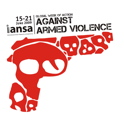 Each year activists around the world use the Global Week of Action Against Gun Violence to raise awareness, campaign for better gun laws and push for stronger regulation of the global arms trade. This year the Week of Action is 10-16 May. Last year, IANSA members in more than 90 countries highlighted the human cost of small arms proliferation and misuse; they also demanded that governments enact policies that put their citizens' security first.
Each year activists around the world use the Global Week of Action Against Gun Violence to raise awareness, campaign for better gun laws and push for stronger regulation of the global arms trade. This year the Week of Action is 10-16 May. Last year, IANSA members in more than 90 countries highlighted the human cost of small arms proliferation and misuse; they also demanded that governments enact policies that put their citizens' security first.
The main topics of WoA 2010 include the support to a Arms Trade Trearty (ATT), to the IANSA-sponsored international campaign "Disarm domestic violence" and to the UN small arms process.
For more information, please see http://www.iansa.org/WoA2010.htm
Final seminar of the project "Trajectories of violence dissemination and containment: a comparative study of Bissau (Guinea-Bissau) and Praia (Cape Verde)"
On the 17th of December, NEP/CES organises at CES Lisboa (Picoas Plaza, Rua do Viriato, 13) the seminar "Violence trajectories: an analysis from the youth", whose aim is to present and debate the main findings of the research project “Trajectories of violence dissemination and containment: a comparative study of Bissau and Praia" (Portuguese Foundation for Science and Technology, 2007-2009).
The seminar, supported by the Portuguese Foundation for Science and Technology and Initiative for Peacebuilding (an initiative funded by the European Union, tem entrada livre. The main goals of the project are the production and systematisation of knowledge and critical analysis of mechanisms of direct violence(s) (collective and interpersonal) dissemination and containment in the cities of Bissau and Praia. Specifically, it aims at assessing the myriad of representations and identity-based construction that intervene as motivation and dissuasion factors for the resort to direct violence mechanisms.
Timetable For Arms Trade Treaty Adopted at UN
1 November 2009
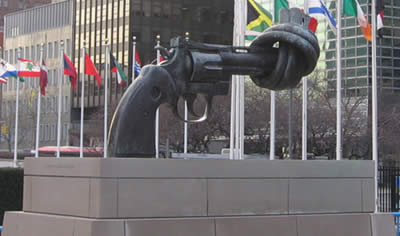 On past October 30, after years of debates, the United Nations agreed a timetable to establish a “strong and robust" Arms Trade Treaty (ATT) to control international transfers of conventional arms.
On past October 30, after years of debates, the United Nations agreed a timetable to establish a “strong and robust" Arms Trade Treaty (ATT) to control international transfers of conventional arms.
This agreement means that the ATT will be negotiated in a series of meetings concluding at a UN Conference in 2012. The resulting treaty is expected to require States to strictly regulate international transfers according to principles based on international law, significantly reducing the human cost associated with the proliferation of conventional arms.
Read more
Unanimous approval of United Nations Security Council Resolution on sexual violence against women and girls in armed conflict scenarios
30 Septmber 2009
On 30 September, the United Nations Security Council resolution 1888 on sexual violence against women and girls in armed conflict situations was approved unamnimously. Resolution 1888 follows resolutions 1325 (2000) and 1820 (2008), both aimed at extending women and girls protection in armed violence scenarios as well as ensuring greater female participation in all efforts of conflict prevention, management and post-war reconstruction.
In sum, Resolution 1888 calls for the 1) nomination of a special representative for overseeing the issue of sexual violence against women and girls in armed violence contexts; 2) constitution of a team of experts on this subject, with the purpose of assisting governments in preventing sexual violence in armed conflict situations, reinforcing the systems of military and civil justice, and ensuring greater assistance to victims of sexual violence as well as access to justice; 3) consideration by the United Nation Security Council members of the pattersn of sexual violence during the process of adoption or targetion of sanctions; 4) integration, whenever possible, of experts on women protection in peace missions; 5) submission of annual reports by the UN Secretary General on the implementation of the Resolution; 6) submission of systematic reports on sexual violence by the United Nations peace missions.
"Luto como Mãe" selected to Rio's International Film Festival
5 September 2009
 The documentary “Luto como Mãe” (“Right to mourn”), produced by Cinema Nosso, Jabuti Filmes and TVZero, will be exhibited in the 14Th edition of Rio’s International Film Festival, in Premiere Brazil. The long-feature on the female face of armed violence in Rio de Janeiro, directed by Luis Carlos Nascimento in partnership with the Observatory on Gender and Armed Violence (University of Coimbra, Portugal) and the Centre for Studies on Public Security and Citizenship (Cândido Mendes University), was premiered past June, in Portugal, for an audience of 300 people present at the Cerca de São Bernardo theatre, in Coimbra.
The documentary “Luto como Mãe” (“Right to mourn”), produced by Cinema Nosso, Jabuti Filmes and TVZero, will be exhibited in the 14Th edition of Rio’s International Film Festival, in Premiere Brazil. The long-feature on the female face of armed violence in Rio de Janeiro, directed by Luis Carlos Nascimento in partnership with the Observatory on Gender and Armed Violence (University of Coimbra, Portugal) and the Centre for Studies on Public Security and Citizenship (Cândido Mendes University), was premiered past June, in Portugal, for an audience of 300 people present at the Cerca de São Bernardo theatre, in Coimbra.
The premier of “Luto como Mãe” in Rio’s Festival will take place on 29 September, in Odeon Petrobras, at 17:00h. The following exhibitions will take place on 30 September, in Est Vivo Gávea 3 (13:30h and 20:00h) and on 1 October, in Odeon Petrobras, at 15:00h.
The documentary was also selected to the Chilean International Film Festival of Viña del Mar, which will be held on 16-21 November 2009.
Photo exhibition "Disarming sight: violence and small arms in Portugal", 12 September
5 September 2009
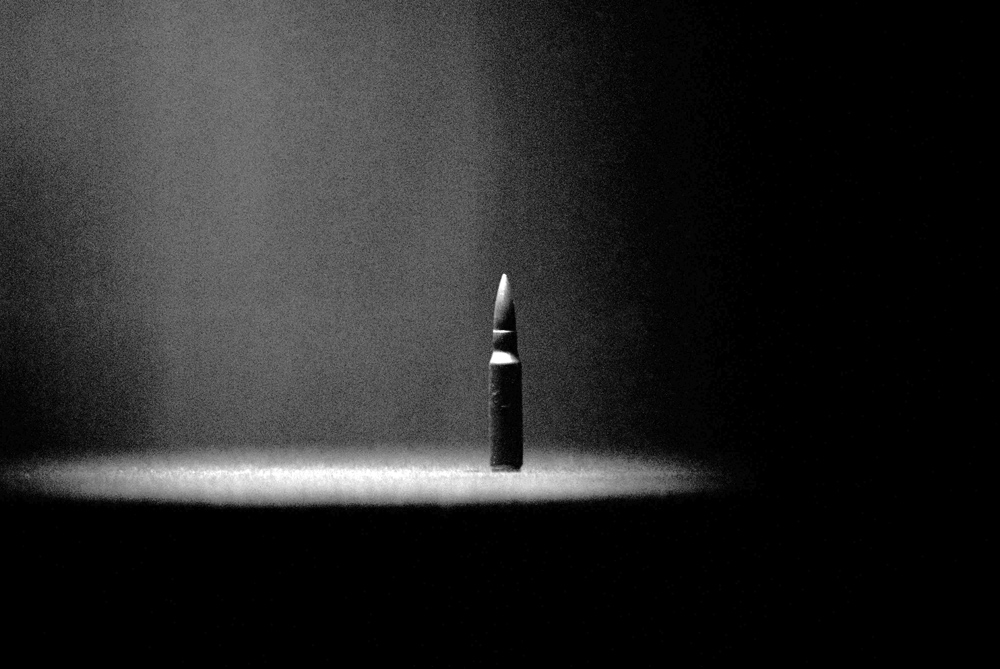 "Disarming sight: violence and small arms in Portugal" is a photo exhibition by Hélio Gomes which documents part of the fieldwork conducted within the research project "Violence and Small Arms: the Portuguese case", funded by the Portuguese Science and Technology Foundation. The exhibition will take place on September 12, in Casa da Esquina.
"Disarming sight: violence and small arms in Portugal" is a photo exhibition by Hélio Gomes which documents part of the fieldwork conducted within the research project "Violence and Small Arms: the Portuguese case", funded by the Portuguese Science and Technology Foundation. The exhibition will take place on September 12, in Casa da Esquina.
Photography, as well as other participatory methods, constitutes an alternative means of research making, more accessible than interviews, which offers the interviewees the opportunity to participate and narrate their experiences differrently. It is then a n alternative account, which seeks to capture the reality of small arms dissemination in Portugal giving voice to its actors, spaces and consequences.
Summer course “The sex of violences”, 9-12 September 2009
5 September 2009
 This four day course aims to bring together researchers, practitioners and activists in the field of armed violence and a) analyse the relations between masculinities, femininities and forms of violence (expressions, actors, strategies and response/prevention policies), which affect countries and societies living in contexts of war and/or peace; b) identify the implications of the segmented hyper-visibility of violence, namely the silencing of other violent expressions and its actors, as well as the absence or inadequacy of response and prevention policies to these forms of violence; and c) promote the interrelationship between research and action and among different publics/agents.
This four day course aims to bring together researchers, practitioners and activists in the field of armed violence and a) analyse the relations between masculinities, femininities and forms of violence (expressions, actors, strategies and response/prevention policies), which affect countries and societies living in contexts of war and/or peace; b) identify the implications of the segmented hyper-visibility of violence, namely the silencing of other violent expressions and its actors, as well as the absence or inadequacy of response and prevention policies to these forms of violence; and c) promote the interrelationship between research and action and among different publics/agents.
Adoption of the Portuguese National Plan of Action on the UN Security Council Resolution 1325
After its adoption in the Council of Ministers held last thursday, the Portuguese National Plan of Action (NPA) for the implementation of the UN Security Council Resolution 1325 (2000) on Women, Peace and Security was published today in the Diário da República. Portugal is now the 15th country to adopt a NPA, joining Austria, Belgium, Cote D'Ivoire, Denmark, Finland, Iceland, Liberia, Norway, Spain, Sweden, Switzerland, Netherlands, Uganda, and the United Kingdom.
Read OGiVA and IANSA's analysis on the Portuguese NPA
Lançamento do livro "Auto de Resistência. Relatos de familiares de vítimas de violência armada", 24 de Julho de 2009
20 July 2009
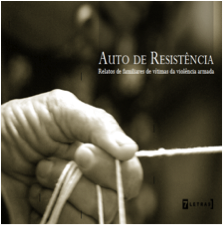
On the 24th of July, at the Museu da República, Rio de Janeiro, OGAV, CESeC and the Publisher 7 Letras present the book "Auto de Resistência. Relatos de familiares de vítimas de violência armada", organised by Barbara Musumeci Soares, Tatiana Moura and Carla Afonso. This book, made up of the testimonies of nineteen relatives of victims, tries to tell a part of Rio de Janeiro's history, one that involves massacres, kidnappings, ommission and impunity. It is not a book of denunciation nor a tale of individual tragedies. It tells the history of the strength of those who resist, those who cannot be intimidated and use their own suffering to prevent the suffering of other people. It tells the history of those who have courage and will to learn and to transform.
Documentary premier “Luto como Mãe”, 29 June 2009
27 June 2009
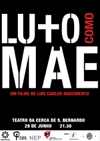 The city of Rio de Janeiro, Brazil, is the site of many summary executions perpetrated by State agents. Each death drags in its wake the pain of those who are left behind, specially family and friend, affecting its entire social network.The documentary “Luto como Mãe” [Right to Mourn], by Luís Carlos Nascimento, is based on the stories of the survivors – mothers, sisters and wives – who have lost their relatives in urban armed violence incidents and who now have to cope with family diruption, financial distress and stigma. In 70 min. we will get to know these women of strength, who struggle for justice and recognition, and their routes from mourning to struggle.
The city of Rio de Janeiro, Brazil, is the site of many summary executions perpetrated by State agents. Each death drags in its wake the pain of those who are left behind, specially family and friend, affecting its entire social network.The documentary “Luto como Mãe” [Right to Mourn], by Luís Carlos Nascimento, is based on the stories of the survivors – mothers, sisters and wives – who have lost their relatives in urban armed violence incidents and who now have to cope with family diruption, financial distress and stigma. In 70 min. we will get to know these women of strength, who struggle for justice and recognition, and their routes from mourning to struggle.
Disarm Domestic Violence in the Global Week of Action Against Gun Violence
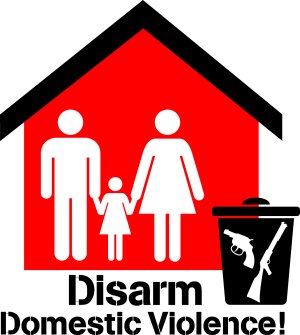 This is the Global Week of Action Against Gun Violence and events are being held in 85 countries to draw attention to the human toll of small arms proliferation and misuse.
This is the Global Week of Action Against Gun Violence and events are being held in 85 countries to draw attention to the human toll of small arms proliferation and misuse.
For women, the greatest risk of gun violence is in their own home. The statistics are shocking. Women are three times more likely to die violently if there is a gun in the house. Usually the perpetrator is a spouse or partner, often with a prior record of domestic abuse. For every woman killed or physically injured by firearms, many more are threatened.
Read Advocacy Project's blog "Disarming Domestic Violence in Portugal"
Global movement against gun violence mourns the disappearance of two members
Viva Rio researcher, Pablo Dreyfus, and his wife Ana Carolina Rodrigues, were on the Air France flight that went missing on 1 June while flying from Brazil to France. Pablo was one of the most well known international experts on small arms control. He and his wife were traveling to Switzerland for an annual meeting of the Small Arms Survey.
24 May 2009: International Women's Day for Peace and Disarmament
24 May is International Women's Day for Peace and Disarmament. The celebration of this day began in Europe in the early 1980s, when hundreds of thousands of women organised against nuclear weapons and the arms race.
Members of the IANSA Women's Network (WN) will be marking the day with events such as peace marches, meetings and demonstrations as well as highlighting their achievements over the past 12 months.
IFOR's Women Peacemakers Programme has developed an Action Pack to mark 24 May which highlights challenges that women activists face in both the Balkans and the Caucasus and elaborates on the strategies these women apply to deal with the challenges. It contains reflections on the peace processes and women activism in Kovoso/a, and humanitarian interventions in Georgia and Kosovo/a. The Action Pack is complemented by interviews with Women in Black, Kvinna till Kvinna and the Women’s Resource Center in Armenia.


|


.jpg)

